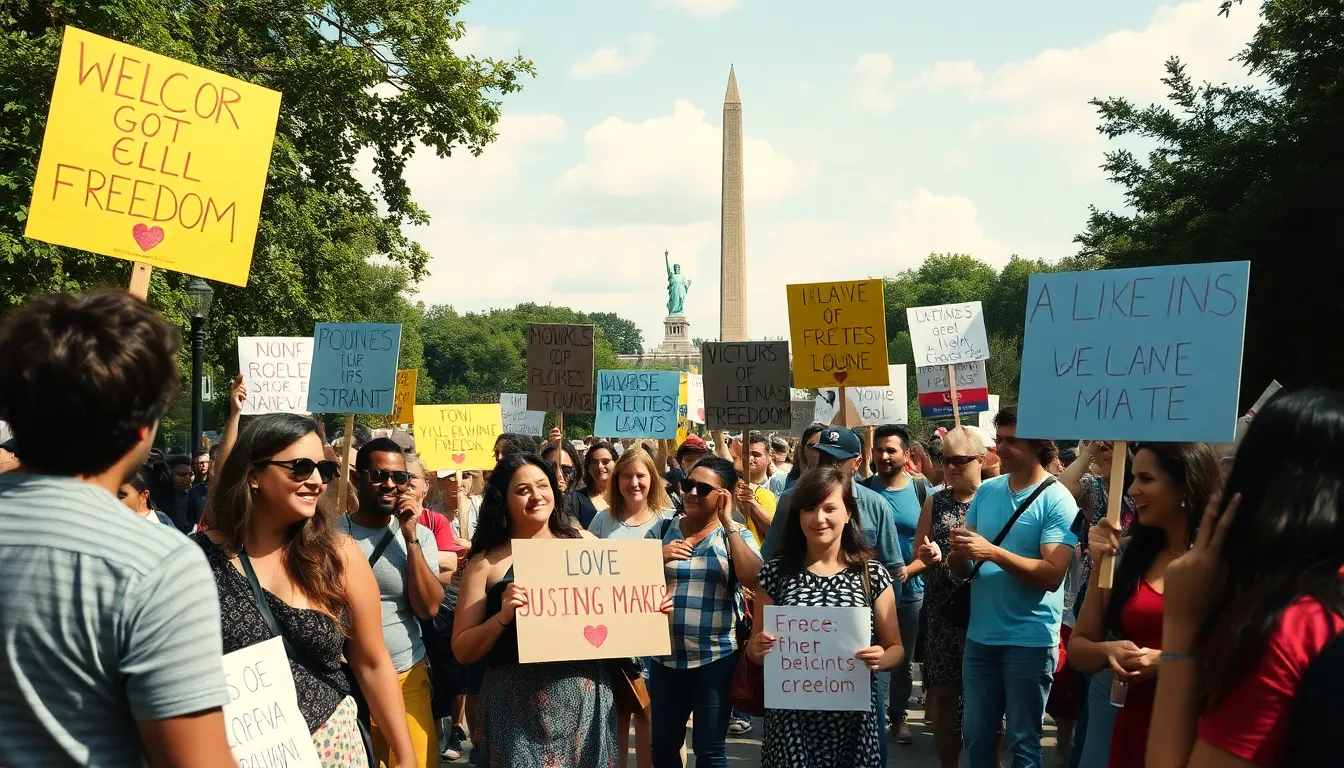As fireworks light up the sky this July 4, a different kind of spark ignites in the hearts of many. The “No Kings 2.0” protest is set to challenge the status quo, reminding everyone that freedom isn’t just about barbecues and parades. It’s about questioning authority and reclaiming the narrative of independence.
In a world where the only crown anyone should wear is a paper one from a fast-food joint, this movement takes a humorous yet serious stand against the notion of rulers. It’s a call to action that invites all to join in the fun of dissent while celebrating the true essence of freedom. So grab your signs and your sense of humor; it’s time to show that when it comes to liberty, there are no kings—only the people.
Table of Contents
ToggleBackground of the No Kings 2.0 Protest
The No Kings 2.0 protest emerged as a response to the traditional celebration of independence on July 4. This movement questions the definitions of freedom and challenges the status quo. Participants aim to highlight that true freedom involves active dissent against authority rather than passive enjoyment of festivities.
Humor plays a significant role in this protest, providing a distinct lens through which individuals can express their dissatisfaction with societal norms. Engaging in this protest means using creative signs and witty slogans to convey serious messages about inequality and governance.
Activists emphasize cooperation, encouraging participants to gather in communal spaces for spirited discussions while fostering connections. Various locations serve as hubs for these gatherings, allowing people to connect with like-minded individuals.
Promotional materials promote the spirit of the protest, urging attendees to reconsider the implications of celebrating freedom while ignoring systemic issues. The community aspect encourages diverse participation, encompassing various age groups and backgrounds, reflecting a broader sentiment of disenchantment with current political climates.
In essence, the No Kings 2.0 protest seeks to redefine independence. It invites everyone to reflect critically on their freedom’s meaning while advocating for a society that prioritizes equality and justice for all rather than allegiance to a ruling authority. Through this protest, participants amplify their voices, calling for systemic change while celebrating the collective aspiration for true liberty.
Key Events of July 4

The No Kings 2.0 protest on July 4 represents a significant movement encouraging active dissent and reflection on the meaning of freedom. This gathering challenges participants to think critically about independence while fostering a spirit of community.
Overview of the Protests
Protests emphasize humor and creativity, inviting individuals to express discontent through clever slogans and signs. Organizers focus on engaging participants in meaningful dialogue about systemic issues affecting society. Collective action draws attention to the gap between celebrated freedoms and ongoing injustices. Various activities encourage interaction, allowing attendees to share personal stories and connect through shared experiences. Through these functions, the protest underscores the importance of questioning authority, particularly in the context of national celebrations.
Major Locations Involved
Major cities across the United States witness the No Kings 2.0 protest, including New York, Los Angeles, and Chicago. Each location creates a unique atmosphere for local participants to voice their opinions. Gatherings take place in public parks, town squares, and near iconic landmarks, enhancing visibility and impact. Local activists collaborate with national organizers to coordinate efforts, ensuring consistent messaging at various sites. Each city’s event attracts diverse crowds, highlighting the widespread desire for change and the importance of unity among participants.
Goals and Objectives of the Protest
The “No Kings 2.0” protest strives to redefine freedom and encourage active dissent against authority during July 4 festivities.
Voices of the Organizers
Organizers emphasize the importance of questioning traditional narratives surrounding independence. They advocate for a movement rooted in humor, urging participants to express discontent creatively. Activists highlight the significance of inclusive dialogue, stressing that true liberation involves challenging systemic issues. Local organizers, in collaboration with national figures, amplify these messages to ensure resonance across varied communities. Through social media campaigns, they foster awareness and invite diverse voices, solidifying the intent to reclaim freedom from ruling powers.
Community Support and Participation
Many community members rally around the values espoused by the protest, demonstrating strong support. Individuals of all ages participate enthusiastically, reflecting a shared desire for social change. Local businesses often provide resources and materials to bolster engagement, encouraging collaborative spirit among attendees. Public gatherings facilitate connections, where like-minded individuals unite for a common cause. Additionally, promotional efforts include workshops and discussion forums that deepen understanding of systemic issues, further enhancing community involvement and commitment to the movement.
Reactions and Responses
The “No Kings 2.0” protest sparked a range of reactions from different groups across the nation. Public discourse reflects both support and opposition, underscoring the complexity of modern independence celebrations.
Public Opinions
Supporters express excitement over the movement’s aim to redefine freedom. Many enthusiasts appreciate the emphasis on humor and creativity in protest efforts. Critics argue that the protest undermines traditional values of independence. Some believe humor about serious issues distracts from the importance of the cause. Engagement on social media reveals an even split among users, with discussions highlighting various perspectives. Several community members emphasize the need for active dissent to drive meaningful change.
Government and Law Enforcement Reaction
Government officials closely monitor the “No Kings 2.0” protests, recognizing their potential impact on public safety. Law enforcement agencies prepare for possible disruptions during July 4 celebrations. Some law enforcement representatives advocate for peaceful engagement with protesters. Coordinating resources ensures that safety remains a priority across major cities. Local authorities encourage dialogue with activists to foster understanding and mitigate tensions. Collaboration between organizers and law enforcement aims to maintain order while respecting the right to dissent.
The “No Kings 2.0” protest stands as a bold reminder that freedom isn’t just about celebration; it’s about questioning the status quo. By blending humor with serious discourse, participants invite others to reflect on the true meaning of independence. This movement fosters a sense of community, encouraging diverse voices to unite in pursuit of social change.
As July 4 approaches, the call for active dissent resonates louder than ever. Whether one supports or opposes the protest, it sparks vital conversations about liberty and authority. The ongoing dialogue around these events highlights the importance of engaging with systemic issues, ensuring that the spirit of freedom remains alive and relevant for all.









